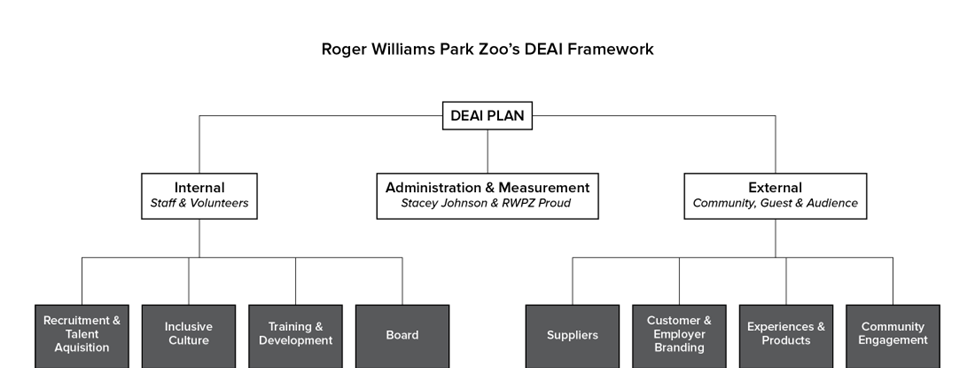Diversity & Inclusion
Roger Williams Park Zoo is committed to fostering, cultivating, and preserving a culture of diversity, equity, accessibility, inclusion, belonging and justice.
Learn MoreWe not only recognize, but hold in high regard, that our staff is the most valuable asset we have. Our individual differences, life experiences, innovativeness, knowledge, self-expression, unique capabilities, and talent are proudly represented in all we do. We respect, encourage, and embrace our differences and what makes us unique. We do this not only because it is important to us, our culture, and the community we serve, but also because it is significant to the work we have passionately done and will continue to do, conserving and celebrating the diversity of wildlife and wild places.
We recognize that conservation begins with how we interact with the places we live, work, and play. Therefore, a conscious commitment to recognizing the richness of diversity in terms of all colors, national origin, ethnicity, races, beliefs including but not limited to religious beliefs or lack thereof, ages, genders, gender expressions, gender identities, gender experiences, sexual orientations, physical appearance, physical abilities, mental abilities, cognitive abilities, neurodiversity, language, education, income levels, socioeconomic status, marital status, military and veteran status, pregnancy, culture, values, backgrounds, experiences, different ideas and perspectives are all critical for us to engage authentically with our closest neighbors as well as our global conservation partners. We imagine a world in which everyone sees themselves as champions for natural resources and leaders in conservation. We will continue to dedicate ourselves to the creation of a community of collaboration and empowerment rooted in the conservation of the natural world.
Diversity, equity, accessibility, inclusion, belonging, and justice are important to us. While they are part of our practices and policies, we also have a stand-alone initiative to re-emphasize its importance.
Diversity & Inclusion Definitions:
Diversity:
All the ways in which people differ, encompassing all the different characteristics that make one individual or group different than another. These groups are not limited to colors, national origin, ethnicity, races, beliefs including but not limited to religious beliefs or lack thereof, ages, genders, gender expressions, gender identities, gender experiences, sexual orientations, physical appearance, physical abilities, mental abilities, cognitive abilities, neurodiversity, language, education, income levels, socioeconomic status, marital status, military and veteran status, pregnancy, culture, values, backgrounds, experiences, and different ideas and perspectives.
Equity:
Proactive reinforcement of policies, practices, attitudes, and actions that result in fairness in power, access to opportunities, treatment, impacts and outcomes for all.
Accessibility:
Giving equitable opportunities to everyone along the continuum of human ability and experience. Accessibility encompasses the broader meanings of compliance and refers to how organizations make space for the characteristics that each person brings.
Inclusion:
Creating involvement, environments, and empowerment in which everyone is welcomed, respected, supported, and valued.
Belonging:
All staff are seen and embraced as individuals with a diversity of lived experiences and feel encouraged to be their authentic selves, express ideas, share experiences, and freely contribute to the team.
Justice:
Everyone has the right to be treated with respect, fairness, and equity. We all share in this responsibility by challenging prejudice and supporting principles, rules, and laws that promote justice. We recognize inequalities that arise from disparities that exist in the distribution of opportunities, power, privilege, and resources. We strive to be more equitable in all we do for our staff and the community we serve.
The Framework- How Our Plan is Organized:
Roger Williams Park Zoo’s DEAI efforts focus on both internal and external constituencies, understanding that our work in each of these spaces (internal and external) is essential to our success in both spaces. An inclusive workplace with a diverse team at all levels will better ensure a broad representation of perspectives and lived experiences in our decision-making as an organization. This diversity of voices and ideas will yield community facing offerings, experiences, and initiatives that better reflect our audiences’ ideals and priorities. Authentic engagement of the communities in which we are doing our work is a key component of how we work toward our mission. When communities see relevance in our work, members of those communities are more likely to join our team, further strengthening our organization and making us more resilient.
Across the internal and external hubs of the plan, there are 8 focus areas. Each of these focus areas has articulated goals and defined projects that support them. A team of focus area champions ensure that the work in these areas is being prioritized and advanced.
Ideally, focus areas should interact and inform one another. For example, insights gleaned in Community Engagement could provide valuable input to developing Experiences & Products, or Training & Development initiatives could help support Inclusive Culture goals.
This initial version of our plan will be operationalized over a two-year timeline. Throughout this period, the administration and measurement team will work with the champions to assess progress and the need for any course correction.


